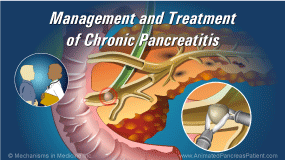Slide Show - Management and Treatment of Chronic Pancreatitis













*Please note: This slide set represents a visual interpretation and is not intended to provide, nor substitute as, medical and/or clinical advice.
The pancreas is a digestive system organ that has two important functions. It produces hormones that regulate blood sugar, as well as enzymes that break down food in the digestive tract.
In chronic pancreatitis, the pancreas is slowly destroyed due to chronic inflammation…
… often triggered by lifestyle factors in predisposed patients, such as long-standing heavy alcohol or tobacco use. Although this is not always the case.
Left untreated or inadequately treated, chronic pancreatitis can lead to pancreatic insufficiency as the pancreas continues to be slowly damaged. This may result in inability to digest and absorb food, nutrition-related disease, and even diabetes.
There is no cure for chronic pancreatitis…
…so the goals of treatment are supportive, such as managing pain, avoiding weight loss, and ensuring adequate nutrition.
Lifestyle changes are also recommended to slow the progression of the disease.
Ensuring adequate nutrition is possibly the most important treatment goal. When the pancreas doesn’t work properly, it affects the body’s ability to get essential nutrients from food.
This can lead to nutrition-related diseases such as weak bones, vision problems, easy bruising, and skin rashes.
The ability to digest fat and protein is the most affected. Therefore, patients are advised to follow a nutrient-rich, low-fat diet, stay well-hydrated, and avoid high fat foods.
Patients may also be prescribed oral pancreas enzymes in a pill form, to aid in the digestion of food. This is known as pancreas enzyme replacement therapy, or PERT.
Vitamin and mineral supplements are also commonly prescribed, as well as painkillers. Sometimes pain is severe enough that narcotics are used…
… or that surgery or endoscopic procedures may be required.
Surgery or endoscopic procedures may also be performed to remove stones that occasionally form and block the pancreatic duct.
Lifestyle changes can slow the progression of chronic pancreatitis.
In addition to a nutrient-rich and low-fat diet, alcohol must be completely eliminated and patients must quit smoking. Environments with second-hand smoke should also be avoided. As well, medications for other conditions may be changed to reduce the burden on the pancreas. In some patients, triglyceride levels must be maintained in a healthy range through diet or medication.
Click here to take our SURVEY
Your feedback is important to us! We will use your feedback to develop future areas of content about pancreatic diseases which will help other patients, caregivers and families.













This educational activity has been developed by: The National Pancreas Foundation and Mechanisms in Medicine Inc.
This educational activity is supported by: AbbVie, Akcea Therapeutics, Boston Scientific, Celgene, Ethicon, and Incyte.





This website is part of the Animated Patient™ series developed by Mechanisms in Medicine Inc., to provide highly visual formats of learning for patients to improve their understanding, make informed decisions, and partner with their healthcare professionals for optimal outcomes.